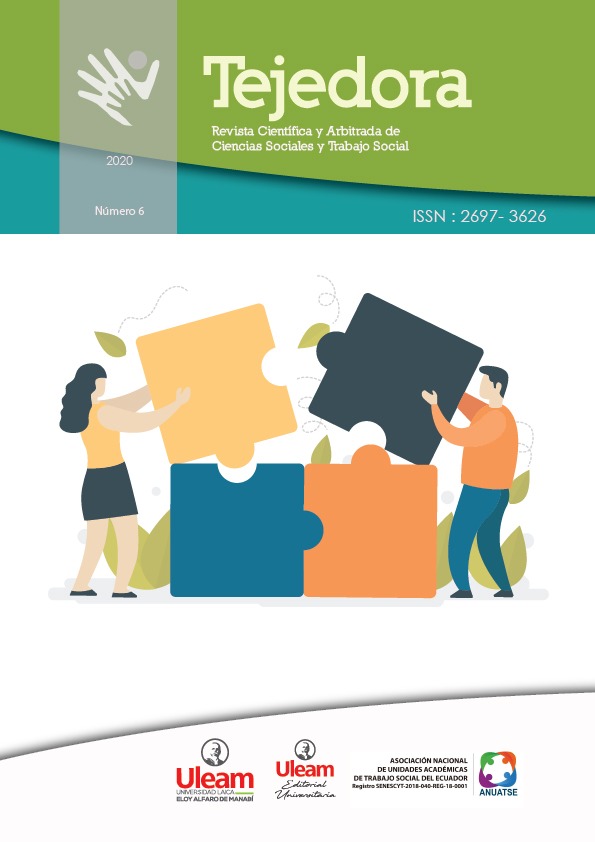Disrespect influence on the emotional state
DOI:
https://doi.org/10.56124/tj.v6i12ep.0115Keywords:
disrespect, work, stress, depressiveAbstract
Disrespect in our society is manifested from one person to another, which does not allow a healthy coexistence, since it violates the main values that are responsible for guaranteeing social harmony; if we take him to the work environment of the judicial officer, this has been affecting his emotional state to the point of limiting his professional performance; That is why the present investigation aims to determine the user's disrespect and its influence on the emotional state of the technical team of the family judicial unit of the Machala canton; we worked from the qualitative approach, interviews were used as tools, this allowed us to collect detailed and precise information that confirmed the hypothesis. This is how the results determine that the negative attitude regarding emotions of disrespect with the staff, by the users, triggers levels of stress that end in depressive states. Therefore, we conclude that the lack of respect, immersed in users who provide public servants in the judicial field, contributes to disagreements in their work environment.
Downloads
References
Arabelen, G., & Kaya, H. T. (2021). Assessment of logistics service quality dimensions: a qualitative approach. Journal of Shipping and Trade, 6(1), 1–13. https://doi.org/10.1186/s41072-021-00095-1
Constitución del Ecuador, 449 Registro Oficial 67 (2008). https://doi.org/10.1017/CBO9781107415324.004
Ley Organica de Servicio Público, Registro Oficial Suplemento 294 1 (2010).
Código penal, 0 1 (2013).
Beenish Khan, & Amir Azam. (2022). The Impact of Workplace Interpersonal Conflict on Job Performance, Job Depression and Turnover Intention. Siasat, 7(2), 149–159. https://doi.org/10.33258/siasat.v7i2.118
Belmonte, M. L., Álvarez-Muñoz, J. S., & Bernárdez-Gómez, A. (2021). Educando En Valores: El Respeto, La Tolerancia, La Igualdad Y La Interculturalidad Como Pilares Básicos / Valorizações Educativas: Respeito, Tolerância, Igualdade E Interculturalidade Como Pilares Básicos. Brazilian Journal of Development, 7(1), 9516–9529. https://doi.org/10.34117/bjdv7n1-644
Carlotto, M. S., & Câmara, S. G. (2019). Burnout syndrome in public servants: Prevalence and association with occupational stressors. Psico-USF, 24(3), 425–435. https://doi.org/10.1590/1413-82712019240302
Chireac, S. M., & Guerrero-Jiménez, G. R. (2021). Valor del respeto por la lengua y cultura quichua: concepto del Sumak Kawsay. Alteridad, 16(2), 275–285. https://doi.org/10.17163/alt.v16n2.2021.09
Daniel, C. O. (2019). Effects of job stress on employee ’ s performance. BiNET, 06(02), 375–382. https://doi.org/10.18801/ijbmsr.060219.40
De Lima Trindade, L., Ribeiro, S. T., Argenta Zanatta, E., Vendurscolo, C., & Dal Pai, D. (2019). Verbal aggression in nursing work at the hospital. Revista Eletronica de Enfermagem, 21, 1–8. https://doi.org/10.5216/ree.v21.54333.
Del Carmen Rendón, N. J., Ramos Vásquez, I., Herrera Flores, D. A., Cuevas Jimenez, A., & Covarrubias Terán, M. A. (2020). FORMACIÓN DE RESPETO Y ATENCIÓN EN LOS ALUMNOS DE TERCER GRADO DE PRIMARIA. Amazónica, XXIV(1), 104–125.
Donnelly, J., & Whelan, D. J. (2020). International Huaman Rights (SEXTA). https://doi.org/10.4324/9780429266072
Ehsan, M., & Ali, K. (2019). The Impact of Work Stress on Employee Productivity: Based in the Banking sector of Faisalabad, Pakistan. International Journal of Innovation and Economic Development, 4(6), 32–50. https://doi.org/10.18775/ijied.1849-7551-7020.2015.46.2003
Gavotto Nogales, O. I., & Castellanos Pierra, L. I. (2021). Las emociones negativas vividas por los maestros en las clases virtuales en tiempos de pandemia. RIDE Revista Iberoamericana Para La Investigación y El Desarrollo Educativo, 12(23), 1–19. https://doi.org/10.23913/ride.v12i23.1006
González Hernández, F. A., León Cortés, S. G., & Silva Gutiérrez, B. N. (2022). Factores de riesgo psicosocial y estado de salud mental en servidores públicos sindicalizados del municipio de guadalajara. Revista de Psicología de La Universidad Autónoma Del Estado de México, 11(26), 125–145. https://doi.org/doi.org/10.36677/rpsicologia.v11i26.19074
Havermans, B. M., Brouwers, E. P. M., Hoek, R. J. A., Anema, J. R., Van Der Beek, A. J., & Boot, C. R. L. (2018). Work stress prevention needs of employees and supervisors. BMC Public Health, 18(1), 1–11. https://doi.org/10.1186/s12889-018-5535-1
Hökkä, P., Vähäsantanen, K., & Paloniemi, S. (2020). Emotions in Learning at Work: a Literature Review. Vocations and Learning, 13(1), 1–25. https://doi.org/10.1007/s12186-019-09226-z
L. Haven, T., & Van Grootel, D. L. (2019). Preregistering qualitative research. Accountability in Research, 26(3), 229–244. https://doi.org/10.1080/08989621.2019.1580147
Lal Pandey, D. (2020). WORK STRESS AND EMPLOYEE PERFORMANCE: AN ASSESSMENT OF IMPACT OF WORK STRESS. Accelerat Ing t He World’s Research, 7(5), 124–135. https://doi.org/https://doi.org/10.1016/j.mehy.2020.109972
Le, L. K. D., Lee, Y. Y., Engel, L., Lal, A., & Mihalopoulos, C. (2021). Psychological workplace interventions to prevent major depression: A model-based economic evaluation. Mental Health and Prevention, 24(December 2020), 200209. https://doi.org/10.1016/j.mhp.2021.200209
Lickley, R. A., & Sebastian, C. L. (2018). The neural basis of reactive aggression and its development in adolescence. Psychology, Crime and Law, 24(3), 313–333. https://doi.org/10.1080/1068316X.2017.1420187
López Moya, D. F., & Pangol Lascano, A. M. (2021). El acoso laboral y la protección jurídica al trabajador en Ecuador. Sociedad & Tecnología, 4(S1), 76–90. https://doi.org/10.51247/st.v4is1.115
Maharaj, S., Lees, T., & Lal, S. (2019). Prevalence and risk factors of depression, anxiety, and stress in a cohort of Australian nurses. International Journal of Environmental Research and Public Health, 16(1), 1–10. https://doi.org/10.3390/ijerph16010061
Minev, M., Petrova, B., Mineva, K., Petkova, M., & Strebkova, R. (2018). Self-esteem in adolescents. Trakia Journal of Science, 16(2), 114–118. https://doi.org/10.15547/tjs.2018.02.007
Naciones Unidas. (2015). DECLARACIÓN UNIVERSAL DE LOS DERECHOS HUMANOS.
Pieper, C., Schröer, S., & Eilerts, A. L. (2019). Evidence of workplace interventions-A systematic review of systematic reviews. International Journal of Environmental Research and Public Health, 16(19), 1–13. https://doi.org/10.3390/ijerph16193553
Piza, D., Amaiquema, A., & Beltrán, E. (2019). Methods and Techniques in Qualitative Research. Some Necessary Details. Revista Conrado, 15(70), 455–459. http://scielo.sld.cu/scielo.php?script=sci_arttext&pid=S1990-86442019000500455
Rasool, S. F., Maqbool, R., Samma, M., Zhao, Y., & Anjum, A. (2019). Positioning depression as a critical factor in creating a toxic workplace environment for diminishing worker productivity. Sustainability (Switzerland), 11(9), 1–18. https://doi.org/10.3390/su11092589
Rogala, A., & Cieslak, R. (2019). Positive Emotions at Work and Job Crafting: Results From Two Prospective Studies. Frontiers in Psychology, 10(December), 1–13. https://doi.org/10.3389/fpsyg.2019.02786
Walsh, J. L., Persky, L. R., & Pinnock, K. (2019). The Effect of High Performing Bullying Behavior on Organizational Performance: A Bullying Management Dilemma. Global Journal of Business Research, 13(1), 71–81. http://search.ebscohost.com/login.aspx?direct=true&db=ecn&AN=1780316&site=ehost-live%0Ahttp://www.theibfr.com/gjbrsample.htm%0Ahttp://www.theibfr.com/gjbrsample.htm
Published
How to Cite
Issue
Section
License
Copyright (c) 2024 Revista Científica y Arbitrada de Ciencias Sociales y Trabajo Social: Tejedora. ISSN: 2697-3626

This work is licensed under a Creative Commons Attribution-NonCommercial-ShareAlike 4.0 International License.






















